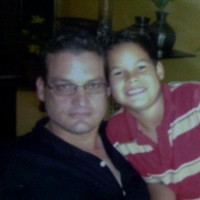Weight Training For Beginners
If you're looking to begin weight training this is a very high quality guide for any novice who wants to add some size, strength and muscle in the most effective way possible. This article will outline the key principles that newbies need to know in order to maximize the gains that a beginner will make and to help them get into the habits necessary to be successful in the world of bodybuilding.
1. Mind-set
A very important and often neglected aspect of bodybuilding by the novices despite it being one of the most important ingredient in success.
A lot of novices fail by only seeing bodybuilding as a short term goal to improve your physique. This lack of desire will almost always lead to failure. You need to forget the thought that you need to get in shape by any certain date or time. You need to see it as a lifestyle if you want to be successful.
You need to accept the shape that your body is in and decide to change your life in order to achieve your objectives. You need to accept bodybuilding as a long term plan, so that you do not become disheartened if it takes a period of time for you to improve. After all if it was easy to do, everyone would be doing it.
You need to set realistic goals for yourself. As a beginner you shouldn't be saying that you want to lose 30 pounds of fat and gain 20 pounds of muscle in a two month period. It's not likely that it's going to happen, and yet over and over again newcomers get this thought in their heads and then become discourage when they can't achieve it. You need to wake up and forget the belief that the health and fitness industry have tried to convince everyone is possible.
You need to be prepared for a lot of hard work and sacrifice if you want to see it as something that you can love and as a chore. You will begin to see bodybuilding as something that separates you from the lazy people who can't be bothered to workout or bother to ask for advice. As soon as you view it as a chore you are setting yourself up to fail.
2.Objective Setting
Your first step is to honestly assess your physique. Then you can decide what you need to focus on most of all.
Lose fat, build muscle. You need to figure out how fat you are, and how small your muscles are, so that you can properly determine where your priorities lie. This is an extremely important step so that you can set some properly attainable targets for yourself.
Keep in mind that or fat loss, the more muscle you build, the more calories your body will be able to burn at rest (approx 50 cals per hour as opposed to 5 cals per hour of fat) and while exercising a Ib of muscle burns roughly 10x as many calories as a Ib of fat (approx 70 cals per hour compared to 7 cals per hour for fat). Therefore, if you can add an extra 14Ibs of lean muscle to your body you will burn an extra 1200 calories per day. That adds up to 8400 calories per week (remember that 1 Ib fat is 3600 calories) so that's almost the equivalent of an additional 2Ib of fat per week that your body burns off just by adding the extra muscle. This will mean that you will have developed a much faster metabolic rate that you would have without that muscle.
You need to set realistic goals for yourself e.g. to lose 10Ibs of fat in 5 weeks and gain 5 Ibs of lean muscle mass. It is a misconception that it is physically more difficult to lose fat than to build muscle. Although it is possible to lose 4 or 5 Ibs of fat in a week, it is not a good ides, as you are likely to lose muscle mass as well. It is impossible to gain 5 pounds of muscle in a week.
As you become more familiar with the exercises, you can begin to setting lifting targets for yourself. Eg. adding 20kg to your bench press in a month, in order to help gauge your overall progress.
3. Training Weights
You will gain the majority of your lean muscle through you weights routine. If you want to make consistent and long term gains you need to make it a priority to have a well structured routine from the very beginning.
Joining a good gym, that offers a well rounded introduction, from knowledgeable staff is the best starting point. You should find a gym with a wide range of both free weights and equipment, that will offer you the ability to work your way up to the larger, heavy weights as you progress.
As a beginner you have to not allow yourself to be intimidated if you are training alongside more experienced bodybuilders. Most bodybuilders tend to be very helpful when encouraging newcomers to the sport that they love. They will not be looking down there noses at you simply because you are new, as everyone had to start somewhere. So if you are unsure of how to correctly do an exercise, then ask a more experienced lifter for some advice and pointers.
It is a good idea to learn how to use the free weights as soon as you can. They allow you to have a much more effective workout of your muscles than the machines will, as you will have a wider range of natural movements. Free weights will also stimulate more of the supporting fibers in your muscle than machines will.
You need to get your form right. It is one of , if not the, most important aspect to your free weight routine. Poor form is very common and it is a major hindrance to you being able to progress towards your goals. Do not sacrifice your form in order to lift more weight as in the end it will do far more harm than good. You will be able to develop muscles at a much faster pace , and lessen the odds of an injury if you take the time and do your exercises properly. As you move forward with your perfect form you will eventually find that you are able to lift more weight, so just take your time and keep your form.
Split your workouts up into major muscle groups.
chest, biceps, triceps, back, traps, legs, calves, shoulders, abs. Train each of these groups once a week and your body will have plenty of time to recover and rest. Your muscles grow when you rest after all.
A nice 4 day split that will not kill you is
- Chest/Triceps/Abs
- Back/Biceps
- Shoulders/Traps
- Legs/Calves
As a good rule aim for 9-12 sets for Large Muscle groups (Chest/Back/Legs) followed by a smaller muscle group for 6-8 sets (Biceps/Triceps/Shoulders/Abs/Calves). Take it easy on your biceps, they are a much smaller muscle than the triceps so they should be kept at the lower end of the set range.
Another good rule of thumb is to work at a weight that allows you to do 6-8 reps while keeping perfect form or until you can't hold good form anymore. At the point where you can do a set of 8 comfortably, add some more weight. 6-8 reps will provide you with the best compromise between hypertrophy gains (muscle growth) & strength gains.
4. Rest
This is extremely important. You should try and give your muscles a week's time to rest in order to allow them to recover and grow. Your muscles do the majority of their growing while you rest, which is why it's important that you train each muscle group once a week.
Overtraining a muscle group can cause catabolysis which means that it will start using up your body's protein source, your muscle. A lot of body builders tend to over train when they are just starting out and are very enthusiastic. Doing so means that while you may see some muscle growth, it won't be nearly as much as you would see if you took the proper amount of rest time in between workouts.
Always get a minimum of 8hrs of sleep every night. Your muscles grow while you sleep, and sleeping less than 7hrs can put you at risk for catabolysis of the muscles, which would mean you'd end up losing your hard earned muscles.
5. Training ¨C Cardio
Cardio training is very important for fat loss and for cardiovascular fitness. Your cardio workout should ideally be on a separate workout session from weights so that your muscle glycogen is used while training in order to fuel your muscles. Performing a cardio workout before your weights could reduce the potency of the weights session.
Cardio with the goal of fat loss should be aimed at 65% Max Heart Rate (MHR) for 30-40 mins and should be done before breakfast so that your body taps into it's own fat stores in order to fuel itself.. If you push yourself harder or further than this your body will begin to take protein from your muscles and this will result in muscle loss.
6. Diet
Eat healthy. Try and eat every 3hrs in order to keep your body fully stocked with protein and to provide your body with a positive balance of nitrogen and maintain a high metabolic rate.
Muscle growth - High Protein, High Complex Carbohydrates, Moderate Fat (good fats ¨C flax seed oil, rape seed oil, etc)
Fat Loss - High Protein, Lower Complex Carb, Very low simple carb, Lower Good Fat, No Saturated Fat.
In order to lose fat you need to be using up more calories than you are consuming and to gain muscle you have to raise the calories to a higher level than you would use. This will lead to a slight fat gain, but with some slight adjustment you will easily find where your level is. A 200lb person should need 200g of protein in their diet per day while bodybuilding.
Always remember to get protein in you before you go to bed, right when you wake up and immediately after you lift weights. This when your body needs protein the most.
Click to read more about Weight Training For Beginners
**********************
We review the popular Muscle Building Programs and Books on the internet. The fisrt thing we do when we review a muscle building program is to make sure it does not contain conflicting, misleading or downright untruthful information thrown together by a self proclaimed muscle expert. All our reviews are based strictly on the quality of the products, customer support and value for money.
Now We invite you to read Top Muscle Building Books Review...
-
The holy grail body transformation program free download
The Holy Grail Body Transformation Program Reviews Tom Venuto, creator
-
Habits that Sabotage Your Ab Building Efforts
We all really want our abdominal muscles to be as strong, firm and
-
A Original Look on the Master Cleanse System
The master cleanse can also be occasionally called the lemonade die
-
The Right Diet for Weight Loss
According to the recent statistics, it has been found that more tha
-
What is Ketosis Diet Plan
You have certainly heard for the name ketosis diet as I have, as well.
-
The Ultimate Steps to Easy Weight Loss
The perfect easy weight loss method has still to be discovered, but it
- DON'T MISS
- Want to know More About HCG Diet Dangers
- How Can I Lose The Fat Around My Belly - How To Get Flat Abs Super Fast
- Weight Loss through the Nutrition Atlanta Approach
- HCG Injections for Weight loss
- Learning About Low Pregnancy Weight
- Weight Loss and Exercising Staying Power - Three Magic Words!
- Weight loss products are everywhere botanical slimming soft gel
- The Right Diet Pill - Where Do You Begin?
- A Low Carb Diet Worked For Me
- Weight Loss Tips for Working Industry experts




